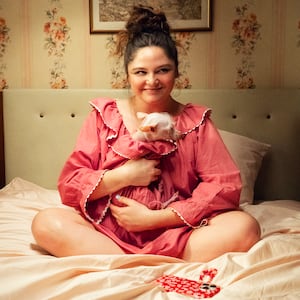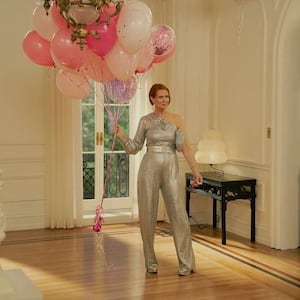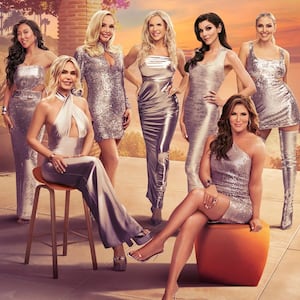This week:
- A new Lena Dunham series to gossip about.
- A new And Just Like That episode to scream about.
- New reboots to actually be excited about.
- A new Hugh Grant photo to rave about.
- A superhero origin story to giggle about.
Is Lena Dunham Still ‘Too Much’?
For an oh-so-brief moment this week, one of my dreams came true: I was in my twenties again.
Everyone was talking about a new TV show by Lena Dunham about characters messily navigating life, love, friendships, and self-esteem issues as they stared down the pressures of actual adulthood and—dear god!—their thirties while living in a major city.
I was roughly the same age as the Girls characters when the HBO series premiered in 2012, and covered the series from that perspective as an entertainment writer for the Daily Beast. So it’s felt like a time warp to be doing the same a decade later for Dunham’s first major TV series since, Netflix’s Too Much, which is now streaming.
(While I remember and enjoyed the short-lived series Camping, which she created but didn’t star in, I was apparently stranded alone on Dunham Apologist Island when that aired, so we won’t count that one.)
But then I had a realization that reminded me that, no, I’m not back in my twenties (sheds tear), and just how much time has passed. Looking at the response to Too Much, it seems like, finally, everyone most people have stopped being so freaking weird about Lena Dunham.
When Girls was airing, Dunham wasn’t so much a lightning rod in a storm of cultural discussion as she was a copper skyscraper during a Category 5 hurricane—a veritable Burj Khalifa made entirely out of conductive aluminum that had apparently caught the ire of Zeus himself. It was the discourse apocalypse.
I was living the hapless New York life of those characters on the show—albeit with, I’d like to think, slightly more stability and fewer instances of getting a Q-tip stuck in my ear. I was both a huge fan of the show and, as a writer for the Beast, a participant in that endless discourse.

Often, I understood complaints from my peers that it didn’t reflect their own experiences, as the show’s broadly descriptive title and Dunham’s declaration in the pilot of perhaps being “a voice of a generation” indicated some sort of definitive universality that the series couldn’t make good on.
And it wasn’t hard to rationalize that audience members of different generations were genuinely baffled by the behavior of the young people they were watching, as scripted by a young person herself; Dunham was 23 when she sold the series.
Dunham proved to be a mystifying character for the media at a time when the blogosphere and social media exploded into open season for criticism, controversy, and impassioned (often vitriolic) hyperbole.
Time, however, has been good to Girls. Its 10-year anniversary was greeted with a shower of glowing tributes to how well it’s held up, and is perhaps even better now viewed outside of the media firestorm that surrounded it during its original airing.
During that decade, Dunham has had a far less public presence and reduced her pop-culture output—and has emerged, during this press tour for Too Much, with a fair amount of insight about that time.
“There were so many angry, seemingly men, and some women dissecting the show in these incredibly conservative terms,” she said in an interview on the Girls Rewatch podcast. “Like, yes there were people in Brooklyn who found us irritating or liberal people who took issue with aspects of the show. But I always had a lot more respect for that. But there was also a big contingent of conservative people looking at it almost as evidence of a certain kind of moral decrepitude—and also making big judgments about our physical bodies, or sexualities.”
And as for the many scandals that her often overly candid comments and opinions caused and the different waves of backlash Girls experienced, Dunham told Variety, “Everyone needs to have their consciousness raised when they’re young. I happened to really learn a lot in my twenties on a pretty public scale.”
What’s been remarkable to me about the launch of Too Much is how quiet it’s been, given how Dunham couldn’t speak 10 years ago with starting the snowball of several news cycles—sometimes deserved, sometimes overblown.
Of course, the mere mention of her name still causes a full-body eye-roll in some people; she was that polarizing. I was also struck by a recent conversation with a youth who didn’t even realize Dunham is—or was at one point—controversial.
Too Much is loosely based on Dunham’s experience moving to London, essentially fleeing the chaos she sowed at the peak of her celebrity as well as a dramatic breakup. (If you believe that the ex-boyfriend character in Too Much is directly based on Dunham’s ex Jack Antonoff, you might have a hard time listening to his music again.)
As such, the lead character, Jess, played by Meg Stalter, is older than Hannah Horvath was in Girls. She’s still a mess, but a different kind of mess: the more mature kind, the kind that happens when we realize that possibilities aren’t endless and ever afters aren’t necessarily going to be happy, no matter how much we chase them.
Admittedly, I don’t love the show. I felt unmoored by the lack of consistent tone in the early episodes, though it really finds it footing around Episode 6. (As a general rule, I don’t love recommending a show with the caveat “just wait for six hours, then it gets really good.”) But as a Girls megafan, it’s undeniably a fascinating companion piece, all these years and life experience later.
It also seems that I’m out of step with the ecstatic response Too Much and Dunham have received on social media:
It will be telling both of how media discourse and how opinion of Dunham has changed if Too Much becomes a big hit for Netflix. For as much as we all talked about Girls, its ratings were minuscule compared to the reach of a popular Netflix series.
What will people say about the one-time “voice of a generation” now that there’s a new one in charge of streaming—and the conversation?
The Carrie Bradshaw Reign of Terror Continues
This week’s episode of And Just Like That unleashed new levels of second-hand mortification, ones I didn’t even realize where possible. I’ve never felt so alive.
For any original Sex and the City fans who still doubted just how far this sequel series has strayed from God’s light (classy brunches at Coffee Shop), this week’s episode makes the girls suffer through a karaoke party. Well, “suffer” is perhaps going too far: Cynthia Nixon’s Miranda, barely recognizable from the original series at this point, had a goddamn ball.
(Aside: Anthony’s pervy bread bakery has now firmly been established as the And Just Like That version of Central Perk, where the ladies routinely convene. While I believe they’d all want to be good friends to Anthony, I don’t buy that these women would ever become regulars at a place so cheesy.)

Making the prolonged cringe-fest more exasperating is that the episode, if you manage to quiet your internal screams for a few minutes, features wonderful hallmarks of SATC’s profound depiction of friendship. (Warning: Spoilers ahead.)
The comedy of errors trying to conceal Harry’s cancer diagnosis eventually leads to a beautiful catharsis when he tells the ladies as a gift to Charlotte. It’s classic SATC. Miranda and Carrie’s frank and, frankly, uncomfortable conversation about Carrie’s flirtation with her neighbor is the kind of honest, complicated scene between close female friends that SATC trailblazed.
This episode should have been a highlight of the season. Instead, the screeches of karaoke will forever haunt it.
Reboots to Actually Be Happy About
I know we’re supposed to be exhausted at this point by movie sequels happening decades after the fact, and more and more series being rebooted instead of networks greenlighting original content.
Sure! I’ve had enough! I’ve had enough… except for the reviving of Scrubs, Practical Magic, and The Devil Wears Prada, all of which are in full swing.
Zach Braff, Donald Faison, and Sarah Chalke are all officially returning to Scrubs. While I worry what that will mean for the future of the commercial industry if Braff and Faison are otherwise occupied, I’m stoked for this.

If, in the years since Scrubs ended, you’ve enjoyed Ted Lasso or Shrinking (or, like me, rewatched Cougar Town several times), then you’re a fan of the quirky-comedy-that-sometimes-gets-too-real vibe that TV creator Bill Lawrence introduced on Scrubs. Given those series’ successes, it seems natural to take a trip back to Sacred Heart Hospital.
I would like to offer a piece of life advice to anyone reading this: If you ever are in need of an immediate rush of serotonin, the best thing you can do is immediately put on the Practical Magic “midnight margaritas” scene. (Watch it here.)
You can imagine, then, the glee with which I met the news that Stockard Channing and Dianne Wiest are returning as the aunties in the sequel that’s now in production.

And when it comes to sequels, I cannot imagine that The Devil Wears Prada 2 will possibly be good; the original was the kind of lightning in a bottle (probably a glass Perrier one) that can’t be replicated. But I’m very curious about how it will play following the news that Anna Wintour stepped down as Vogue’s editor-in-chief.
Related: Did you see that an ad for her position was apparently put on LinkedIn, as if that’s how they’d possibly hire for that position? Should I apply? The Devil Wears the Same V-Neck Tee He Bought at the J.Crew Factory in 2016.
The Mood of the Week
As one of society’s most noted Sleep Enthusiasts, I was particularly moved by this image of Hugh Grant apparently snoozing during a Wimbledon match this week.
The Best Superhero Origin Story
The first time I learned who the actor David Corenswet was, it was on the TV series Hollywood, in which he played a male escort who we saw absolutely rail Patti LuPone. He is now playing Superman in the new film, and I just think that’s beautiful.
More From The Daily Beast’s Obsessed
As Jaws turns 50, here’s why you’ll always be a little afraid to go in the water. Read more.
One of my favorite performers, Patti Harrison, played a huge part in the Poker Face season finale. Read more.
I’ve never experienced something quite like the pandemonium from the surprisingly young audience at Heathers: The Musical. Read more.
What to watch this week:
Foundation: This should have the same scale of audience as Game of Thrones. (Now on Apple TV+)
The Institute: A just-OK creepy Stephen King is always going to be better than 90 percent of other creepy series. (Sun. on MGM+)
Dexter: Resurrection: Michael C. Hall is back… again. You just can’t keep a good serial killer down. (Now on Paramount+)
What to skip this week:
Sovereign: Just now getting over that the little boy from Room stars in this. (Now in theaters and VOD)
Love Island: Beyond the Villa: God help me, there’s a spinoff of this series. (Sun. on Peacock)









